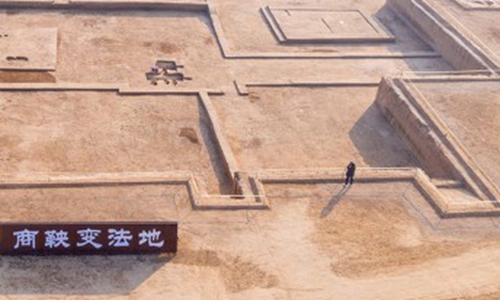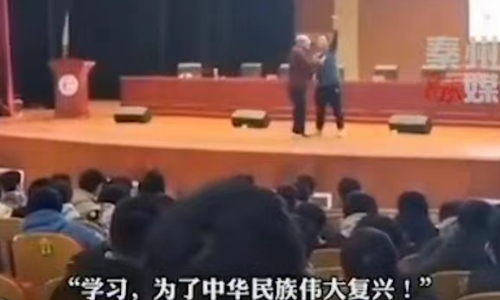Istanbul, Turkey, February 15. The Chinese rescue team went to the market before returning to China. The Turkish citizens applauded and expressed their gratitude and respect along the way. They were proud of the Chinese heroes!
You are using an out of date browser. It may not display this or other websites correctly.
You should upgrade or use an alternative browser.
You should upgrade or use an alternative browser.
China News Thread
- Thread starter KYli
- Start date
2,400-year- old 'flush toilet' discovered in Shaanxi Province
By Global Times Published: Feb 15, 2023 10:01 PM

The No.3 Ancient Building at the Yueyang City Ruins in Northwest China's Shaanxi Province.Photo:Sina Weibo
A pottery toilet ancient Chinese used during the Qin Dynasty (221BC-206BC) has been discovered at the Yueyang City Ruins in Northwest China's Shaanxi Province.
The ancient relic consists of two parts, an indoor toilet on a platform and a pipe system below that directed sewage outside.
The discovery was made by experts excavating the No.3 Ancient Building at the Yueyang City Ruins. While the upper structure of the device has not been found, Fan Mingyang, a design expert specializing in ancient agricultural tools, told the Global Times that the Qin Dynasty toilet looks "deceptively advanced" as it seems to have had a flush water drainage system akin to modern toilets.
The discovery is the only "toilet" to have been discovered at an ancient Chinese palace archaeological site. Archaeologist Xue Feng told the Global Times that the discovery reflects the lifestyle and social landscape of the ancient capital city of the Qin State.
Prior to the discovery, two large palace buildings, No.3 and No.11, were excavated at the site. The two buildings date to a time period stretching from the Warring States Period (475BC-221BC) to the Qin (221BC-206BC) and Han (206BC-AD220) dynasties.

The Yueyang City Ruins in Northwest China's Shaanxi Province.Photo:IC
Typical of ancient Chinese buildings, the two rectangular buildings faced south. According to Liu Rui, a researcher at The Institute of Archaeology, four wadang, a type of tile used to decorate a building's eaves, were also discovered at the northwest, northeast, southwest and southeast corners of the building No.3.
"The locations provide important data for solving an academic debate concerning where ancient people installed wadang," Liu noted.
Located in the Yanliang district of Yueyang, the Yueyang City Ruins were the capital of the Qin State for more than 30 years, before the capital moved to Xianyang, also in Shaanxi Province, during the Qin Dynasty. The Reforms of Shang Yang, a political movement that powered the rise of the Qin state, also occurred at the Yueyang site.
There are a total of 15 architectural sites at the Yueyang City Ruins. They make excellent references for research into the "urban planning" of the Qin State.
According to exploration and excavation data, Liu said that researchers have discovered a north-south axis through the entire No. 3 palace building. The discovery holds value for studying the architectural layout of the ancient Qin capital.
This is called soft power.
Istanbul, Turkey, February 15. The Chinese rescue team went to the market before returning to China. The Turkish citizens applauded and expressed their gratitude and respect along the way. They were proud of the Chinese heroes!
Why is this dumb shit keeps on happening? And why the overt Japanese display of culture rather than Chinese? Are these dumb f.. Ng Chinese that much of an idiot to suggest that a copy of Chinese culture is better?Another case of "cultural infiltration" via school textbooks. Apparently Yue Fei is now a samurai, kids wear kimonos and Mt. Fuji is somehow in China.
View attachment 107524
Why is this dumb shit keeps on happening? And why the overt Japanese display of culture rather than Chinese? Are these dumb f.. Ng Chinese that much of an idiot to suggest that a copy of Chinese culture is better?
Okay, I don't really know. But didn't kimono originate from the Tang dynasty?
Quick, fasionistas of the forum provide the ancient answer, before members of the forum turn to porno pictures to find out.
China's health insurance reform: What is changing?
2023-02-20 10:20:57CGTN Editor : Xue Lingqiao
As many places in China have rolled out the health insurance reform, some residents noticed their monthly health insurance income was cut less.
Before getting outraged about the change, let's look at what the benefits are, and the bigger picture of China's health insurance system.
China's current health insurance system has two parts: a national fund paid by employers that covers serious or chronic diseases, and a personal fund paid by employers and employees together for day-to-day doctor visits.
The personal fund is managed, as the name suggests, by employees themselves. The national fund is managed by the government, with part of the money going directly to employees as cash – this is where the income cut took place.
Exchanging cash for benefits
Running for over 20 years, the system is naturally getting out of date, leading to a balance problem.
The reform was announced in April 2021, and has been rolled out over the subsequent months.
According to latest media reports, over 80 percent of the personal fund is in the hands of younger, healthier people, while the retired, who need the fund the most, have insufficient funds to get treatment.
One of the goals of the reform is to reach a new balance.
The reform
Under the new system, more cash will be kept in the national fund – so people are getting less cash.
In return, the money will be used to cover at least 50 percent of day-to-day doctor visits.
So the "lost" money will be used to pay for more coverage. And the coverage can be high if a resident visits doctors often.
What's more, personal funds can now be used on family members, giving healthy people an option to use the money in a meaningful way.
It's not 'bankrupt'
Some netizens on social media speculated that the reform was pushed forward to use personal fund to feed the national fund that had no money left.
The national fund still has plenty of money. Official statistics showed the fund's income in 2021 was nearly 1.19 trillion yuan (about $170 billion) and its expense was only 932 billion yuan (about $136 billion).
The fund is not losing money, not to mention being emptied. So it makes no sense for the government to "steal" money from people's pockets – after all, the money is used for patients. It's unhealthy to let the money stockpile in the hands of healthy people.
supercat
Colonel
Rescuing a stork:
Moving finless porpoises:
Protecting whooping swans:
Moving finless porpoises:
Protecting whooping swans:
Authorities investigate Hefei college teacher who said foreigners have superior blood linage
By Global Times Published: Feb 20, 2023 10:08 PM Updated: Feb 20, 2023 10:04 PM

Photo: Sina Weibo
Anhui's provincial education authority has launched an investigation into a college teacher in the capital Hefei, after he reportedly told students that foreigners have superior blood lineage, thus encouraged students to marry foreigners; along with other controversial comments.
Chen Hongyou, from Hefei Normal University in East China's Anhui Province made comments during a seminar on Saturday at a middle school in Lujiang, Hefei.
Whist waiting for the PowerPoint to function, Chen spoke off the cuff with students, telling them that they should marry foreigners, who has superior blood lineage, and advised against students who are studying abroad from coming back to China.
The associate professor also said if students are enrolled in two China's most prestigious universities, Peking University and Tsinghua University, they can choose any woman in China; and if they were to study abroad, they can choose woman in the world, according to media reports.
He also made other controversial comments such as "studying is about earning money."
Videos circulating online shows that Chen was booed by his audience. A student later rushed to the stage and grabbed Chen's microphone, saying that "we study for the great rejuvenation of China."
News reports of Chen's speech soon went viral, with many netizens scolding his remarks as being inappropriate for a teacher to make public, and could easily misguide teenagers.
On Monday, Anhui's local education authority said it is investigating Chen's comments. The city of Hefei on Sunday set up an investigation team, and will hold the middle school in Lujiang responsible for allowing such comments to be shared by a guest speaker.
Hefei Normal University also said on Sunday that it suspended classes of Chen, who is an associate professor with research areas focus on education and psychological consultation for middle school students. Chen's name was also removed from the university's website as of press time.
Lujiang middle school said it won't punish student who grabbed the microphone, as he is brave and has the right values, and that local officials will follow up on how events unfolded.
Student recorded video:

